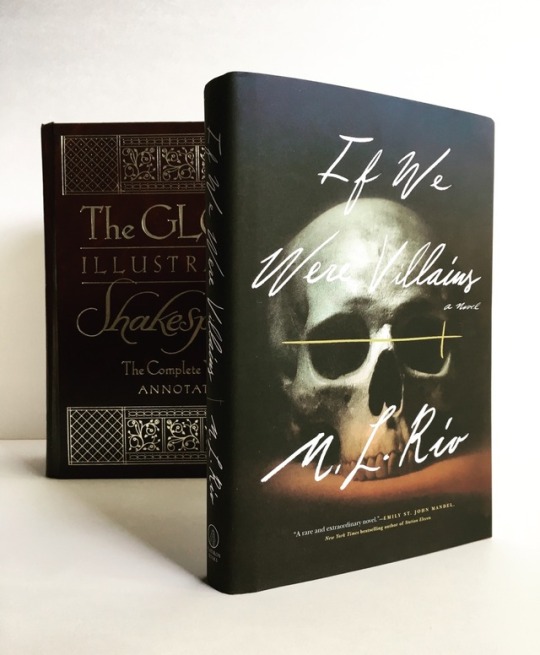Photo


Giveaway Contest: We’ve partnered with Flatiron Books to give away FIVE copies of M. L. Rio’s newly released (and critically praised) literary thriller If We Were Villains!
To enter, you must: 1) reblog this post, and 2) be following macrolit on Tumblr (yes, we will check ;P). Easy, right? We’ll randomly choose one winner on each of the following dates: 11 April, 19 April, 25 April, 2 May, and 9 May. This is an international giveaway. Good luck!
Listen to the Prologue
Order here
5K notes
·
View notes
Text
The Two Gentlemen of Verona
I had never read Two Guys, A Girl, And Pizza Place – I mean, The Two Gentlemen of Verona (hereafter referred to as Gentlemen or Two Gents) before now. This is probably because it’s not one of the big, hyped Shakespeare plays (see: Hamlet, Macbeth, King Lear), but upon reflection it could stand to be performed more often? Small cast, simple plot, neat – if completely ridiculous – resolution.
Anyway, I hadn’t read it, but I guessed, based on the title, that it was about two dudes from Verona. And I was right. That’s pretty much it.
Without even realising it, I’ve leapt straight from “Shakespeare’s Last Play” (Tempest) to this, which some people believe was “Shakespeare’s First Play”. It was definitely an early play, and an early comedy, written probably somewhere between the late 1580s and early 1590s. While I’m not usually someone who’s like, “Oh, it’s an early play, which is why it sucks!” it… might have something to do with why it’s not great.
Don’t get me wrong. Gentlemen has friendship, passion, conflict, drama, loyalty, and cross-dressing! (And really, what else is there?) But after stepping off the ship from Prospero’s cell and landing in Milan, finding this scene on shore is a little underwhelming. Where are the harpy spirits and chess motifs? Why is nobody half naked and swearing at the sky? Also, Gentlemen is #problematic. But we’ll get to that.
So many, so so many of Shakespeare’s plays are about, or involve intimate male friendships. This is because intimate male friendships were a Big Deal, at the time, and not just in a gay way, but in a totally heterosexual, platonic way. (But sometimes also in a gay way.)
The difference between Shakespeare and other writers who lauded male friendships is that Shakespeare is… suspicious of them, or suspicious of the idealized versions of them. In all his plays about male friendship, these friendships aren’t perfect. I will talk more about this at length during my summary, I guess, but also when we read Hamlet later. (I feel a great many things about Horatio.)
The first imperfect friendship we’re going to meet is these guys, Valentine and Proteus of Verona. (A part of me wants to already press pause and say, seriously? Valentine and Proteus? What kinda on-the-nose names are these? But then I remember that, as far as I know, while Chaucer had already somewhat popularised Valentine as a saint of love, I actually have no clue how widely that kind of language was used. And also “Proteus” doesn’t just mean “First” (first lover, first character, first play?) but is also, like, a god of the sea? So really I need to calm down about my etymological leaps.)
Act One
Here’s the deal. Valentine is about to leave Verona to go explore the world (see: Milan), but he doesn’t want to leave without Proteus. Normally, these two guys are inseparable! Amigos! Compadres! Guys being dudes, dudes being guys! But alas, Proteus can’t leave Milan. Why? Because he’s in looooove. He’s so gone for this chick Julia that he turns down an all-expenses paid gap year with his bff. In the next scene, we find Julia chatting with her friend Lucetta, and the conversation is basically this--
Lucetta: That Proteus guy totally has a thing for you.
Julia: Oh my god, really?
Lucetta: Uh, yeah! It’s sooooo obvious.
Julia: I guess he’s… cute.
Lucetta: Julie… babes… you literally wrote I Heart Proteus in your notebook eight times since I walked into this room.
Julia, looking down at her notebook: Oh shit, you’re right. I mean. What?
Julia is so determined to deny that she likes Proteus that when Lucetta says she has a letter from him Julia literally rips it up! And then tries to piece it back together and kisses it? Like Helga Pataki or something. It’s the weirdest. (1.2.99-123)
Meanwhile, Proteus’ dad doesn’t understand why his son would want to waste his time at home when he could go have bro-tastic adventures in Milan. (Also, I just checked: Milan and Verona are… very nearby each other. You could walk there in just a few days.)
Proteus has received a letter from Julia saying she loves him back! They’ve traded vows! He gave her a ring! But he doesn’t tell his dad about that, because he is worried his father won’t approve. So Antonio – that’s dad – forces Proteus to go to Milan and have some fun, damnit.
Act Two
In Milan, we meet Silvia, the object of Valentine’s affections. He’s all over her like a rash, but he seems incapable of understanding how she flirts. Ironically, Speed – Valentine’s servant from Act 1 who is supposed to be dim as a rock – seems to be the only smart, funny character who Gets Stuff. (Unless I’m reading him as being too sarcastic where he is supposed to be sincere.)
For example: Valentine writes a love letter to Silvia, and she tells him to keep it. He says, “Wait, no, it’s for you?” and she says, “Yeah, I asked you to write it. But it’s for you.”
“I’ll write you another one, then.”
“Then after you write that, read it, and if you like it, good. If you don’t like it, then think of ways to make it better.”
“And what if I like it?”
“Then keep it for yourself.” (2.1.109-123)
Exit.
Valentine is (I guess understandably) frustrated, but Speed, speaking in rhyme/verse (where he normally speaks in prose), makes fun of the situation, like, “Hahaha, you essentially wrote yourself a love letter, lmao.” Speed explains that Silvia is flirting by having Valentine write love letters and giving them back to him. She is giving him love letters: “Herself hath taught her love himself to write unto her lover.” (2.1.156)
I have a soft spot for the fools, especially the fools that make fun of love and romance. Maybe I’m giving Speed too much credit, and he’s not actually smart/witty, just mean and a foil for the lovestruck protagonists. Fools are pretty much always a case of the wisest words coming from the foulest mouths. ANYWAY.
Silvia’s dad wants her to marry this guy Thurio, who she’s not keen on at all. And when Proteus turns up, he immediately forgets all about Julia and decides that he also wants to marry Silvia. Men are so predictable.
See, Valentine’s busy ribbing Proteus about Julia, and while Proteus is like, “Julia’s not a goddess. I just like her, mortal flaws and all,” Valentine is busy espousing the holy divinity of Silvia. Something in Proteus’ brain flips. He must have that goddess.
Back in Verona, Julia is coming up with a Flawless Plan to go see Proteus in Milan. She needs to see him again or she’ll die. (2.7.15)
But she can’t travel as a woman, alone, without a male escort! So, she does what any rational woman would do, and decides to disguise herself as a boy. (Worth reminding you again: Milan and Verona are about 93 miles apart. That’s about a 3 day journey on foot.)
As this is the first time we, on this blog, are witnessing crossdressing in Shakespeare, it is worth reminding you that women did not act on the Elizabethan/Jacobean stage. All female characters are played by boys in drag, essentially. So when crossdressing happens – and it almost always happens with a girl pretending to be a boy – what is actually happening on stage is that a boy is pretending to be a woman pretending to be a boy. Layers!
Act Three
Proteus is plotting against Valentine, because nothing comes between two best dude friends better than a sexy lady. He tells Thurio – the other suitor – that Valentine has been sneaking up to see Silvia at night and that they’re planning on running away to elope.
Thurio is like, “wtf?” and dobs this in to Silvia’s dad. The Duke is like, “Yeah….. I know….. it’s an issue.” Doubly an issue because Valentine has been tryna play the Duke like a harp. The Duke is too quick for this and tricks Valentine into revealing all his wooing techniques, and through some sort of weird trick involving a ladder (the logic of this train of thought remains unclear?) finds Valentine’s love letter to Silvia and is like “AHA!!!! YOU FIEND!!!”
Valentine is told to leave Milan and never return. Boom. (3.1.120)
The Duke is all, “Gee, I’m so glad my new friend Proteus tipped me off to all this. He’s such a stand up guy.”
Silvia, who was really into Valentine, is super pissed at her dad, and also wants nothing to do with Proteus since he’s the one who screwed everything up for her. Meanwhile, Proteus is trying to play Valentine’s old game, and pretends to be in favour of Thurio marrying Silvia. (Hint: this won’t work out well.)
Act Four
On “the frontiers of Mantua”, Valentine and Speed get attacked by outlaws. If Mantua sounds familiar, it’s also where Romeo get’s banished to in Romeo and Juliet, so it’s clearly where all the rejects from the Italian justice system get sent.
Valentine lies to the outlaws and says he was banished by the Duke for killing a man. And they’re like, “Oh shit! This guy is legit! Let’s make him our leader!”
And that’s how Valentine becomes the leader of a pack of outlaws.
Meanwhile, Thurio is futzing up his wooing of Silvia, because Proteus is giving him really bad advice, like singing bad songs and generally being annoying.
There’s also a bit here where Proteus says, “… Yet, spanial-like, the more she spurns my love / The more it grows and fawneth on her still.” (4.2.14-5). This is almost the exact same line that Helena says in Midsummer re: Demetrius. Just worth mentioning.
This is when Julia enters, in boy’s clothes. (So, I guess it’s been three days.) She hears this song about Silvia and is like, “Woooooow. Ok. So… this sucks.”
Even worse, she overhears a conversation between Silvia and Proteus, where he says, “Look, I was in love once, but that chick is dead, so… I’m wide open.” And Silvia responds, “That’s sad and all, but you also stabbed your best buddy in the back like a total tool. So I can never trust you, let alone love you.”
Silvia plans to escape Thurio, Proteus, and her father, and head to Mantua where she and Valentine can be together. Also, she gets rid of the little dog that Proteus gave her. Because who needs that shit around.
When Proteus sees that his dog has been returned to him, he’s like, “Fine! I can up my game!” He turns to Julia, who for some reason he doesn’t recognise, a la Lois Lane not recognising Superman when he has his hair done a little different, and says, “Take this ring and give it to Silvia.”
It’s Julia’s ring! She is… crushed.
When Julia goes to give the ring to Silvia, like a lamb, she basically bursts into tears and says, “I knew Julia. And this belonged to her. And he wants to give it to you. But if she knew… she would… probably die forever and ever.”
Silvia – who, in my opinion, realises that this boy is actually Julia – says, “Take the ring, and this purse of money. Look, I’m crying too. Wow. Ok, bye.”
Act Five (i.e. when things deteriorate quickly).
Silvia wants to get the hell out of Milan, and she and Sir Elgamour talk about their plans outside Friar Patrick’s cell. They’re gonna run away! That always works well.
(A lot of conspiring happens in, or by, a friar’s cell – see: Romeo and Juliet.)
Meanwhile, Proteus being grilled by Thurio about Silvia. Does she like me? Does she hate me? What is going on! What Proteus really wants to know is what Silvia said to Julia aka Sebastian.
But before we can get any answer – the Duke bursts in and announces that Silvia has disappeared! Dun dun dun.
“She’s fled unto that peasant Valentine.” Clever dad.
In the next scene, we find Silvia in the forest, alright, but Sir Elgamour is nowhere to be found! In fact: Silvia is being held captive by outlaws. I’m sure you, who is not an idiot, can see where this is going.
In the next scene, Valentine gives a speech about how lonely being the inexplicable leader of a band of outlaws can be, and how all he really wants is Silvia. Who cares about unchecked power and the loyalty of violent criminals when the love of your life has been taken away from you? Sigh.
But then, there’s a suspicious noise – and lo and behold, enter Proteus, Silvia, and Julia!
Valentine steps aside into the shadows to eavesdrop on their conversation.
Apparently Proteus (and Julia) helped rescue Silvia from the outlaws before she could successfully be taken to Valentine.
“What do you mean you still don’t want to fuck me!” Proteus complains. “After me and my servant rescued you and everything!”
“Dude,” Silvia replies, “I would literally rather be eaten by a lion than have you rescue me from anything.” (5.4.33-34)
“It’s a damn shame when a woman can’t love when she’s loved,” says Proteus.
“It’s a damn shame when Proteus can’t love when he is loved by Julia who, yeah, I know is still alive, you steaming pile of human garbage. Also, I love Valentine, who was supposed to be your best friend,” Silvia replies – though I may be paraphrasing a little.
This is when Proteus, and I shit you not, “seizes her” and says, “I’ll woo you like a soldier, at arms’ end / And love you ‘gainst the nature of love – force you.” (5.4.59-60)
That’s right. Proteus fully intends to rape Silvia then and there.
Valentine leaps out of the shadows and goes to rescue Silvia from Proteus, rightfully calling him all sorts of despicable names that I’m sure would have been very insulting to someone four hundred years ago.
Naturally, Proteus drops everything (‘everything’ being Silvia) and apologises profusely.
“Okay, cool,” Valentine says.
Wait, what? OKAY COOL? “Then I am paid, / And once again I do receive thee honest”? How?
Similarly shocked by all these developments is Julia, who swoons.
When everyone rushes to her side, she says, “Oh, I forgot to give Silvia this ring…”
“But… this isn’t the ring I gave you to give Silvia. This is the ring I gave Julia!” Proteus says, like a genius.
“Oh, right. I meant this ring,” Julia corrects herself, taking out the ring that she had given Proteus that he had then given Silvia. (Lots of rings.)
“But wait, how did you get this ring?” Proteus asks, still not getting it.
This is when Julia gives up and has mercy on everyone, and reveals herself to not be a little boy named Sebastian but a grown woman! And a very specific grown woman!
After a bit of blushing about being seen in such immodest attire, Julia and Proteus kiss and make up. So now instead of a very messy love triangle/square/octagon, we just have two happy couples! Yay, heteronormativity restored!
Thurio, the Duke, and the band of outlaws all then rock up, presumably for the closing song. Are there going to be any consequences for anyone’s actions? No? Does Thurio hold this against Valentine? Absolutely not! What about the Duke? Any issues with his daughter ending up with the leader of a band of murderers?
“Sir Valentine, / Thou are a gentleman, and well derived; / Take thou thy Silvia, for thou hast deserved her.” (5.4.158-59)
Nope, and nope.
Closing remarks?
I think we can see why Two Gents isn’t considered a piece of High Art in the way a lot of other Shakespeare plays are. It’s essentially the Shakespearean equivalent of a sitcom, or a formulaic romantic comedy. When trying to look Deep into Two Gents, most people point to the gender relations and the complications that arise with crossdressing on stage. There are also grounds to investigate the role of forests in Shakespeare’s plays – if it happens in the woods it’s bound to be interesting. Then of course there are the all-encompassing questions about love, and the truth of love, and the relativity of that truth. Proteus was so in love with Julia that he almost couldn’t bear to leave Verona, and yet as soon as he saw Silvia, any love he felt for Julia went flying out the window. Shakespeare once said that love looks not with the eye, but with the mind. I would say that Two Gents preaches exactly the opposite. Absence doesn’t make the heart grow fonder; it just sets it loose on the nearest soft object.
Things to accompany The Two Gentlemen of Verona
Two Guys, A Girl, and a Pizza Place (1998- 2001) starring Ryan Reynolds.
The Road to El Dorado
“Same Girl” by R. Kelly and Usher
I dunno, every sitcom ever.
15 notes
·
View notes
Text
Shakespeare Resources!
A list of Shakespeare-related websites that I thought some other Shakespeeps may find useful!
First and foremost, here’s the entire Shakespeare canon available for free (and in the public domain!) online.
Shakespeare lexicon and quotation dictionary. Does exactly what it says it does and VERY helpful for close reading!
All Shakespeare characters. You can sort alphabetically or by number of lines.
List of plays from longest to shortest.
The entire text of Hamlet quarto 1 (the “bad quarto”).
Jstor’s awesome resource where you can browse plays line-by-line and see which jstor articles quote which lines.
Helpful scansion lexicon.
No Fear Shakespeare—a “translation” of some of the plays into contemporary English. Keep in mind that this is one author’s interpretation and can miss nuances, but still often useful.
In case you need a data set of all the plays in raw text.
Medieval bestiary.
Extremely comprehensive family tree of English monarchs.
Hope some people find this useful!!
1K notes
·
View notes
Photo









bad shakespeare aesthetics: much ado about nothing (requested by @broadyay and many others!)
1K notes
·
View notes
Text
The Tempest
I started my reading list with The Tempest because it’s the first one in my copy of The Complete Works. It’s also a little bit poignant because Tempest is one of those plays that People believe “means” something about Shakespeare (or, as he will be colloquially referred to on this blog, Billy Shakes). It was probably one of his last plays, and because it’s about an old man giving up his craft, People say that it is about Shakespeare giving up The Theatre.
I don’t know about all that. What I do know that Shakespeare had daughters, and that the way he wrote father-daughter relationships is very particular and interesting. However, using his plays to try and expose truths about the playwright can be really unproductive. I’ve tried it and it’s hard and usually wrong. That being said, the plot is pretty wild.
[what follows is a plot summary. for hasty, last minute thoughts, skip to the end.]
Act One
Surprise! It’s about a tempest! We open in Act 1 with a storm, and a ship caught in the fustercluck.
The Boatswain and Shipmaster are like, “Nooo!” and the passengers are like, “Please God, I don’t want to die at sea! I want to die on land!” (1.1.63-65)
These passengers are: Alonso, the King of Naples, his brother Sebastian, his son Ferdinand, his counsellor Gonzalo, and Antonio, the Duke of Milan. Basically, the who’s who of Italy.
After this expository storm scene, we jump to a nearby island to meet our protagonists, Prospero (old, weird, presumably funky smelling), and his daughter, Miranda (young, nubile). Also, Miranda is the only female character in the play, which means we’re off to a really great start of continually failing the Bechdel test.
“Papa,” Miranda says, probably. “What is up with this freaky storm? Is that a shipwreck over there? Also, who am I?” (1.2)* (See notes at the bottom re: Miranda’s questions, memory, and this entire exchange.)
Here’s the deal: Miranda is fifteen, and has never met anyone other than Prospero, her father, or Caliban, the dude he keeps chained up in a cave for reasons that will become clear (but make that fact no less alarming).
Prospero, on today of all days, decides to be honest with Miranda about his past and her identity. This is a classic Billy Shakes move: exposing the noble lineage of a character to move the plot along. The sad tragic backstory is this: [cue violins]
Prospero used to be the Duke of Milan. Antonio is his evil, scheming, usurping brother. (Gasp!) Back when Miranda was a toddler, Prospero spent all his time reading magic books, and his brother was like, “I should be the duke!” King Alonso was in on it as well, and they shoved Prospero and Miranda on a boat and left them out at sea. Gonzalo gave them food, clothes, and water, but more importantly, the magic books! (Thanks, Gonzalo.) They eventually made it to The Island, where Prospero was like, “Chill,” and set up camp for the rest of time. (1.2.36-173) (It’s a long story.)
So the storm is Prospero’s revenge. He’s gonna really make life hard for the guys on the boat. (1.2.180). Miranda tries to ask another question, but her dad spells her to sleep instead, naturally.
This is where we meet Tempest’s real MVP: the spirit Ariel. Unfortunately, we don’t get to see him in action just yet. Instead we hear his tragic backstory. [Violins again, please.]
Before Prospero came to the island, it was ruled over by an evil witch named Sycorax. (Notice how men who practise magic are good magicians and women who practise magic are evil witches? Yeah, that’s a thing.) Prospero killed Sycorax, freed Ariel from the tree he was captive in, and then immediately enslaved him again. (1.2.257-293)
Prospero has promised Ariel that he will free him, as long as he follows through with the plan to separate, torment, and punish the shipwreck victims. Ariel’s like, “Already on it, boss.” And he flies away. (1.2.300)
When Miranda wakes, they go visit Caliban, Sycorax’s son! Wild. He collects their firewood and complains about it, mostly.
Meanwhile, Ariel has found Prince Ferdinand and is luring him in with sweet music. Miranda, who has never seen a man who is not a) super old or b) horribly disfigured, immediately falls madly in love with him on sight. Too bad, so sad, Prospero locks him up.
Act Two
We open on Antonio and Sebastian, who – I’m not gonna lie – I have always gotten a weird evil lovers vibe from. Is that just me? Probably.
They put their heads together and decide to kill the king, who is super bummed out because he thinks his son is dead. So if he dies, then Sebastian would be the new King of Naples! And Antonio would be the Duke of Milan and they could have slumber parties! Flawless plan. But as they go to behead the sleeping men, Gonzalo wakes up.
“Hey guys, what are those swords for?” he asks.
“Uh… we heard a monster?” they say, you know, like liars.
They don’t know how right they are, as we cut to–
Caliban, who is chopping wood (naturally) and starts to soliloquize on how much he hates Prospero, which is pretty understandable. I mean, a guy comes and kills your mother, steals the land you grew up on and were destined to inherit, and then enslaves you? That’s a huge bummer.
Enter Trinculo, the court jester, who was also in the shipwreck. The scene that follows is slapstick AF, providing a much needed break in the action of Slavery this and Drowned Souls that. He and Caliban end up under the same cloak for shelter from the storm, and Trinculo says, “Misery acquaints a man with strange bedfellows!” (2.2.42.)
Too true, Trinculo. Too true.
Another survivor, the butler Stephano, rocks up, only he has a whole lot of wine with him. Get in, buddy. He thinks that Caliban and Trinculo look like a weird beast, and decides the best course of action is to feed it the rest of the wine. Caliban gets smashed, immediately. Then Trinculo pops out and says, “Stephano, buddy! It’s me!” Happy friends are reunited, and now have a drunk, pliable, and desperate Caliban believing that they are gods and that wine is divine nectar, and that they’ll be able to kill Prospero! Sounds logical.
Act Three
Because there’s not much to do on an island populated by three people, Ferdinand is the new Caliban and is in charge of woodcutting. He waxes poetic about how the work is hard, but his love for Miranda makes it all okay. (i.e. “This work is hard, but I am harder, eh-hey!”) (3.1.1-15)
It’s cool though because it’s totally mutual. Prospero isn’t too keen on it, and is spying on them from a distance like the creepy, overprotective father he most certainly is. He’s conflicted because Miranda has never been happier, but also his baby girl is growing up! [violins, again]
The important thing about this scene, I think, is the language about servitude. We’ve seen a whole lot of different kinds of servitude in the play so far - mostly, you know, involuntary. Miranda and Ferdinand exchange willing, voluntary vows, declaring their love for and service to each other. (See, kids? Love is a prison.)
Meanwhile, on another part of the island, Stephano and Trinculo are getting Caliban even drunker.
More importantly, Ariel comes in, invisible to them, and plays them some kickass tunes on his pipe. This is where one of the best known passages from the play comes from.
Caliban
Be not afeard. The isle is full of noises,
Sounds, and sweet airs, that give delight, and hurt not.
Sometimes a thousand twangling instruments
Will hum about mine ears; and sometime voices,
That, if I then had wak’d after a long sleep,
Will make me sleep again; and then, in dreaming
The clouds methought would open and show riches
Ready to drop upon me, that, when I wak’d,
I cried to dream again.
(3.2.130-137)
I love this part because this is where we finally start seeing the island for what it is: a haunted fairytale world. Caliban, who’s lived there all his life, doesn’t know what the noises are, or even the spirits that make them. His connection to the island is so innate and deep that he doesn’t question this mystery, just accepts it. It’s *clenches fist* so beautiful.
Back with the merry group of Italian Nobles, shit is about to get real. They’re busy complaining about their feet being sore, or whatever, and then… “solemn and strange music; and PROSPERO on the top, invisible.”
Strange shapes enter the stage with a banquet. Sebastian is like, “Cool, I believe in unicorns and fairies now, this is absolutely nucking futs.” (3.3.22)
Before the nobles can eat, though, the greatest ever stage direction I’ve ever read in my life.
Enter ARIEL, like a harpy; claps his wings upon the table; and, with a quaint device, the banquet vanishes.
First of all: enter Ariel, like a harpy? Can you think of anything more beautiful and terrifying than seeing a giant bird-spirit with an enormous wingspan emerge from the air, slam its fists down in front of your face, and vanish everything there? This is why Ariel is my MVP. He’s just such a drama queen.
I’m also hugely fascinated by the “quaint device” situation, here. There’s a good chance my MA thesis will be on magic/witchcraft on stage. As Tempest is a late play, probably 1610-11, it was written and performed under King James, who was obsessed with witchcraft. Magic tricks weren’t just slight of hand, back in the day, they were fully, completely real. The audience, the actors, and the king all believed in the supernatural.
Anyway, Ariel makes this big speech about how he is a spirit of vengeance who is there to punish them for what they did to Prospero, before vanishing in thunder.
Act Four
“Sorry I, like, imprisoned you, or whatever,” Prospero says to Ferdinand. “But you can totally marry my daughter. As long as you don’t bone her until after the wedding. Or else I’ll do… something. Something magic and weird.” (4.1.1-23)
“Cool,” says Ferdinand.
Ariel, when Prospero asks, brings down the spirits/deities Iris, Ceres, and Juno to bless the union. Then some nymphs, then Reapers. Which reminds Prospero suddenly! Caliban, Stephano, and Trinculo were on their way to kill him! Yikes.
With the help of Ariel’s trusty invisibility cloak, they manage to spy on them, and then set dog/hound spirits on them, and scare them away. Too easy.
Act Five
Finally, Ariel is going to be set free! After god knows how many years stuck in a tree stump, and thirteen years at Prospero’s beck and call, he’s going to be set free!
Only no.
What proceeds is a super sad scene where Ariel, telling Prospero how the Merry Italians are faring (spoiler: not well), feels a deep tug on his ol’ sympathy wire. Or, rather, “Mine would, sir, were I human.” (5.1.19)
Who is the monster and who is the man? Huh? HUH?
While Ariel goes off to fetch the shipwreck victims, Prospero makes an awesome speech about how cool and powerful his magic is, and how, alas, he is going to give it up. Because he cannot be a wizard and a Duke, can he? Also, it seems to me that his main power was, you know, enslaving people and spirits who can do his bidding. Not exactly kosher.
Ariel returns with the Italians and Prospero finally confronts them. Of course, they’re like, “Are you real? I’ve seen so much crazy crap today I wouldn’t be surprised if you were a figment of my imagination.”
But no, he has a pulse, and he has aged, and he is real!
He confronts everyone, left and right. Sebastian, Antonio, Alonso - nobody is safe! (Except for Gonzalo who he’s chill with.)
He even gives them a twist by saying, “I’ve lost my daughter…” and while they’re like, “NO!” he says, “PSYCHE! I meant because she married the prince! Booyah!”
Meanwhile, Ariel repairs the ship, fills it with supplies, and sends the captain to pick everyone up.
“FREE ME!!!!” he seems to be screaming, through clenched teeth.
Caliban, Trinculo, and Stephano all emerge, in stolen clothes, reeking of wine and, probably, their own piss. Everyone heads back to the ship, bound for Milan.
But first - “My Ariel, chick / That is thy charge. Then to the elements / Be free, and fare thou well!”
Finally. Finally.
Epilogue.
To be fair to those who think Prospero is kinda sorta Billy Shakes himself, Prospero’s epilogue sounds a lot like an old man giving up his trade, there on the stage. In fact, he begs to be set free from it.
Really, it was Prospero who was the slave all along. A slave to his circumstances, his trade, his life. Heavyhanded? Yes. An attitude that maybe diminishes the suffering endured by the actual slaves in the story? Probably. But in the end, it’s Prospero who needs to be freed from the shackles of the play, of magic, of fury, a quest for revenge, and his life on the island.
What makes Prospero’s epilogue sound like a speech being given by Shakespeare is that he asks the audience for permission to step down: “As you from crimes would pardon’d be, / Let your indulgence set me free.” (19-20)
Only can the audience set him free - not the other characters. The epilogue happens for us, not for the sake of the plot on stage. It is our job to pardon Prospero for his crimes. Our job to let Shakespeare put down his pen, I guess.
My real interest in Tempest is, as I said, in the stagecraft of it, and the implications of performing, or re-enacting the supernatural on stage. I’ll likely think about this more when it comes to things like Macbeth, Midsummer, or any play with supernatural elements, like Hamlet.
Other fascinating points:
colonialism/land ownership
colonialism and language - (Caliban: “You taught me language, and my profit on’t Is I know how to curse. The red plague rid you For learning me your language!”)
that Ariel was freed from the stump implies that he was captive in the land. I’m sure there’s some kind of eco-criticism about this, somewhere, but I don’t know if I care enough about eco-criticism to follow it up
Memory
Antonio has convinced himself that he did not wrongfully usurp his brother, for instance.
Miranda cannot remember… anything? (See Kevin Ohi (2015), ‘Forgetting the Tempest’, in Dead Letters Sent: Queer Literary Transmission (pp. 49-66). University of Minnesota Press.)
The way in which Prospero constantly qualifies the story (1.2), asking her if she’s listening, if she’s paying attention, etc. implies that she might not be listening, that she perhaps can’t pay attention, that she might not remember. Despite knowing that the shipwreck victims are alive and safe, Miranda let’s Ferdinand believe that his father is dead - or, perhaps, she does not remember that Alonso is alive.
Caliban’s memory of his mother, of his island, of his childhood - it leads us to the question of who is the custodian of knowledge, of memory, for a place?
Performances and rituals
magic, marriage, masques (oh, i like the sound of that.)
And yeah. What a plot summary. Catch me never writing one again.
Things to accompany The Tempest:
Margaret Atwood’s Hag-Seed
The Little Mermaid and/or Pocahontas
Julie Taymor’s The Tempest (2010) where Helen Mirren plays Prospera.
“The Island: Come and See/The Landlord’s Daughter/You’ll Not Feel the Drowning” by The Decemberists.
17 notes
·
View notes